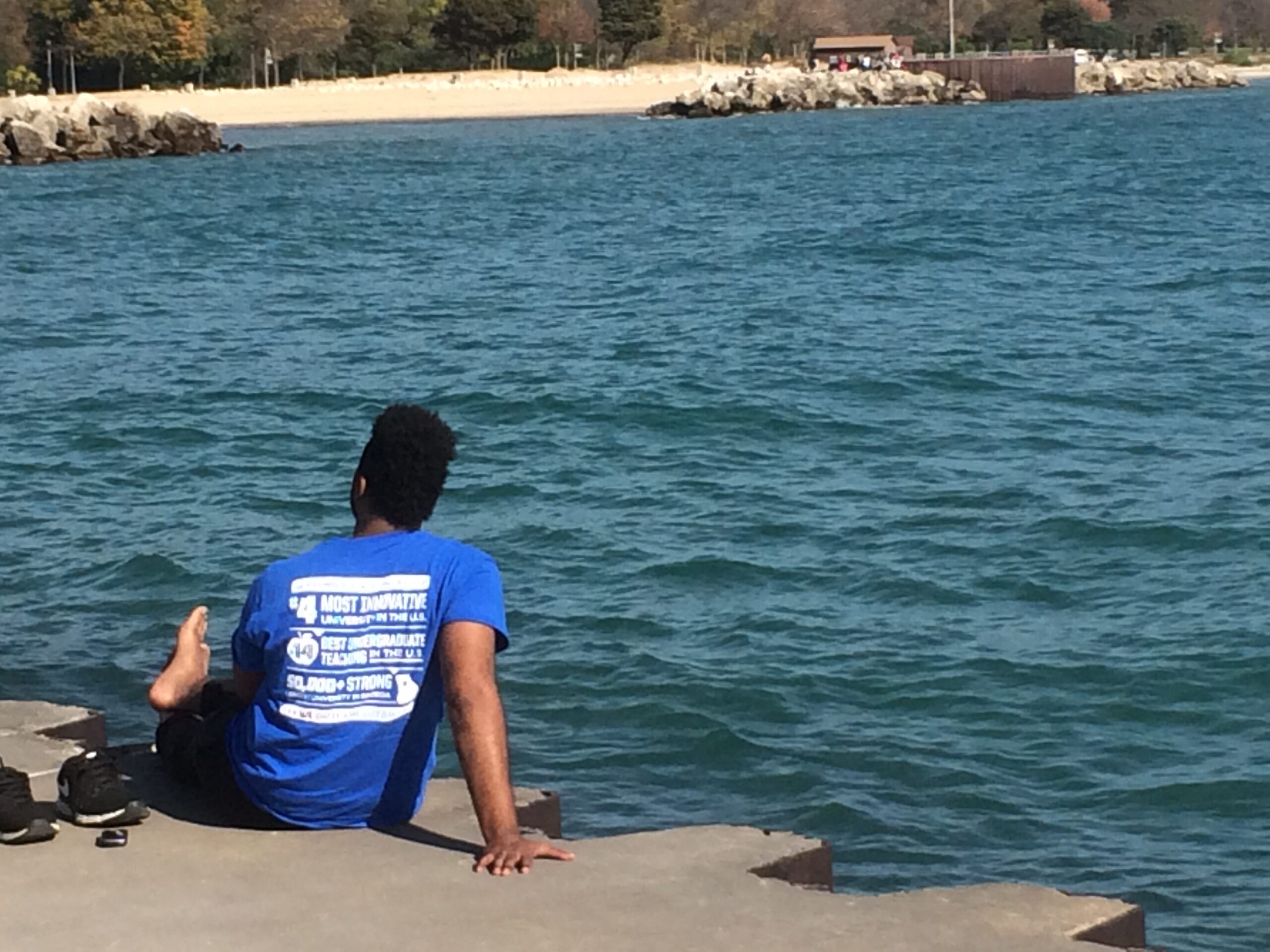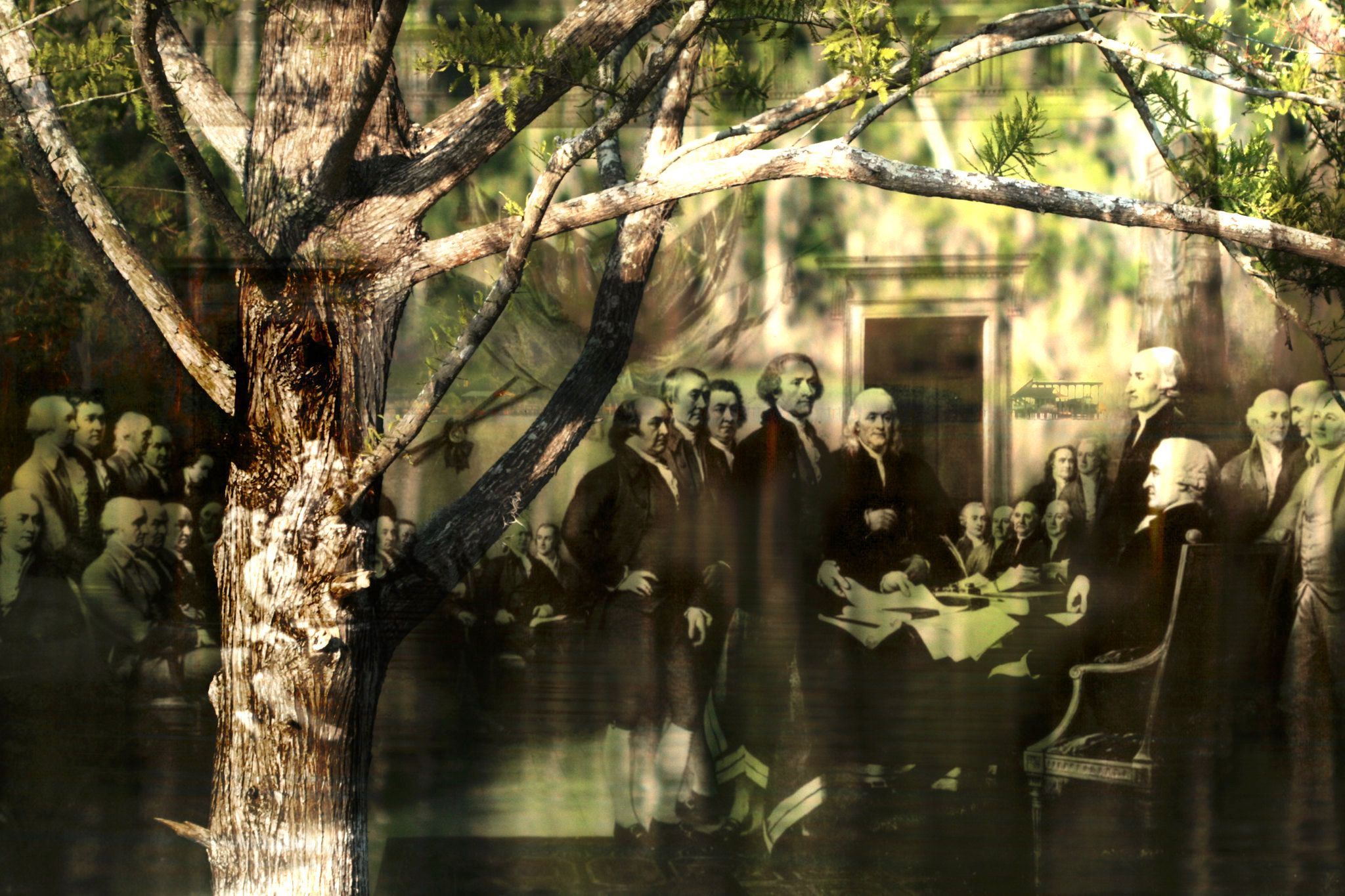Privacy is the most violated of personal rights, writes Andrew P. Napolitano, as government agents evade the natural right to privacy and pretend the Fourth Amendment doesn’t apply to them.

Milwaukee jetty. (Corinna Barnard)
By Andrew P. Napolitano
“Every move you make
And every vow you break
Every smile you fake
Every claim you stake
I’ll be watching you.”
—“Every Breath You Take,” song by The Police
 The Fourth Amendment to the U.S. Constitution guarantees the right to privacy. Like other amendments in the Bill of Rights, it doesn’t create the right; it limits government interference with it.
The Fourth Amendment to the U.S. Constitution guarantees the right to privacy. Like other amendments in the Bill of Rights, it doesn’t create the right; it limits government interference with it.
Shortly before he announced his withdrawal from the presidential race, President Joe Biden misquoted the late Justice Antonin Scalia suggesting that Justice Scalia believed that the Bill of Rights creates rights.
As Justice Scalia wrote, reflecting his view on the origins of all personal liberty, the Bill of Rights secures rights, it doesn’t create them; it protects them from the government.
Those who drafted the Bill of Rights recognized that human rights are pre-political. They precede the existence of the government. They come from our humanity.
The idea that rights come from our humanity is the essence of Natural Law theory, which was first articulated by Aristotle in 360 B.C. The natural law teaches that right and wrong are discoverable by the exercise of reason and there are areas of human behavior — the exercise of rights — that are immune from government interference. Aristotle’s views would later be refined by Cicero, codified by St. Thomas Aquinas, explained by John Locke, woven into Anglo-American jurisprudence by British and American jurists, and immortalized in the Declaration of Independence by Thomas Jefferson.
Thus, our rights to be alive, to think as we wish, to say what we think, to publish what we say, to worship or not, to associate or not, to assemble with others, to defend ourselves from crazies and tyrants, to travel, to own property, and to be left alone are all hard-wired into our human nature.
Nature is the means through which God passes along His gifts to us. We come about by a biological act of nature. God’s greatest gift to us is life, and He tied that gift to free will. Just as He is perfectly free, so are we.
In exercising our free wills, we employ rights. Rights are claims against the whole world. They don’t require approval of a government or neighbors or colleagues. The same rights exist in everyone no matter their place of birth, and each person exercises them as she or he sees fit. The government should only come into the picture when someone violates another’s natural rights.

Montage based on painter John Trumbull’s “Declaration of Independence.” (ArteZoe, Flickr, CC BY-SA 2.0)
So, if someone without your consent builds a house in your backyard, you can knock it down and expel the builders or you can ask the government to do so.
Suppose the builders haven’t consented to the existence of the government? That does not absolve them. Though government is only moral and legal in a society in which all persons have consented to it — this is Jefferson’s “consent of the governed” argument in the Declaration — the only exception to actual consent is the legitimacy of employing government to protect natural rights.
Professor Murray Rothbard modernized Natural Law theory in part with his non-aggression principle (NAP): Initiating or threatening force or deception against a person or his rights is always morally illicit. This applies to all aggression, especially from the government. The folks building a house in your backyard have either used force or deception to get there. Both violate your natural rights and thus the NAP.
The Most Violated of Personal Rights

NSA headquarters, Fort Meade, Maryland. (Wikimedia Commons, Public domain)
Now, back to the Fourth Amendment and privacy. In a famous dissent in 1928, which two generations later became the law of the land, the late Justice Louis Brandeis argued that government surveillance constitutes a search under the Fourth Amendment and thus, per the express language of the amendment, cannot be conducted by the government without a warrant issued by a judge.
He famously called privacy the right most valued by civilized persons and described it as “the right to be let alone.”
Today, this is the most violated of personal rights — not by judges signing search warrants for surveillance, but by governments ignoring and evading the natural right to privacy and pretending that the Fourth Amendment does not apply to them.
The linchpin of the amendment is the judicial determination of the existence of probable cause — meaning that it is more likely than not that a crime has been committed, and that there is evidence of that crime in the place to be searched and in the things to be seized.
Today, the feds — and this has been picked up and mimicked by local and state governments — have convinced themselves that so long as they claim they are looking for threats to national security, they needn’t follow the Fourth Amendment.
Today, the government rarely bothers to obtain a search warrant for surveillance because it is cumbersome to do so and because it is so easy to surveil on a massive scale without one — and worry about the Fourth Amendment afterward.
Today, the National Security Agency — the federal government’s 60,000-person strong domestic spying apparatus — captures every keystroke on every desktop and mobile device, and every conversation on every landline and mobile device, and all data transmitted into, out of, or within the United States without search warrants.
As well, you’d be hard-pressed to find a geographic area that is not covered by police using “sting ray” hardware that tracks the movement and use of mobile phones.
When Edward Snowden passed the facts of massive warrantless spying in the Bush and Obama administrations to journalists in Hong Kong, he had them put their mobile devices in his hotel room refrigerator, as anywhere else would have alerted his former colleagues of their collective whereabouts.
The government spends hundreds of billions of dollars annually just to watch and follow us. Who authorized this? Why do we tolerate it? What kind of society hires a government to secure rights and then watches it destroy them?
Andrew P. Napolitano, a former judge of the Superior Court of New Jersey, was the senior judicial analyst at Fox News Channel and hosts the podcast Judging Freedom. Judge Napolitano has written seven books on the U.S. Constitution. The most recent is Suicide Pact: The Radical Expansion of Presidential Powers and the Lethal Threat to American Liberty. To learn more about Judge Andrew Napolitano, visit https://JudgeNap.com.
Published by permission of the author.
COPYRIGHT 2024 ANDREW P. NAPOLITANO
DISTRIBUTED BY CREATORS.COM
The views expressed are solely those of the author and may or may not reflect those of Consortium News.

The Judge has stuck his neck out to bring good solid free expression from the press. The one thing that Napitiliano has done, that most people in this country don’t do, is to be brave enough to put his skin in the game. Just like Ritter, who has been slammed, he has brought experts in the journalistic field to share their opinions and bring to light the truth, which has been well hidden by the main street media. He has the American people’s rights in his sights and has written extensively concerning these things. I take my hat off to someone that is willing to stand up and say what needs to be said.
I could not agree more Charles.
Those who oppose hearing the truth are not anti-social, anti-American misfits. If fact in my opinion they display very human concerns, concerns seeded in true patriotism.
Americans have lost their way. No one can honestly blame 911 on anything but a gross failure of the security/intelligence community. A government that had ample warning of suspicious individuals traveling about the US.
To quote Samuel Clemens, Patriotism is loving and defending your country, and the government when it deserves it. Check your Constitution and the recent missteps in Israel and Ukraine.
The corporate controlled monstosity now in power is shoving nationalism down our throats. And they are ahead of any movement to change US politics for the better.
It seems very obvious by “BOSTONS” comment on “antisocial behavior” he is more than willing to judge how others should live based his example below. Especially if he happens to agree with the so called politics involved.
The more I think about his statement the more convinced I am that he is fine with being ruled rather than governed which is where we are headed.
BOSTON I have a question for you can you explain to me what behavior is more antisocial than genocide?
Indeed the US government was created to secure rights and has grown so corrupt that we watch it destroy them. Why do we tolerate the complete corruption of all branches of state and federal governments? Because:
1. Most citizens are too young, uneducated, or inexperienced to see beyond simple boob tube narratives;
2. Glimpsing the truth leaves most terrified, outraged, and feeling helpless, so they retreat to the MSM narrative;
3. As H.L. Mencken noted “The average man avoids truth as diligently as he avoids arson, regicide, and piracy on the high seas, and for the same reasons: it is dangerous, no good can come of it, and it doesn’t pay.”
The US is ruined and rotted. It has grown this way for more than a century. Our morally corrupt unregulated market economy elevates only its lowest scammers. Our government consists now of traitors and subversives at the top, and bought-off careerists below them. All three branches of the federal government and the mass media are completely corrupted.
The solutions are:
1. Constitutional amendments prohibiting election activity or funding beyond limited individual donations;
2. Constitutional amendments prohibiting mass media activity beyond limited individual donations.
3. Public and mass media education to identify and avoid dangerous social dependency upon tribal groups;
Getting there is the problem. One proposed reform is the CongressOfDebate (dotcom), which will conduct balanced text debates and provide summaries commented by all sides. Its administration may be a model for an incorruptible democracy of the future.
Can we talk about the loss of personal freedoms without discussing the Patriot Act as well as the various NDAs that have been passed over the years?
You have the right to your opinion and I have my opinions and rights also. I happen to very much disagree with your inference that you don’t any see any serious issues with the so called Patriot Act. The Patriot Act was supposed to be a temporary measure of sorts. No matter how you cut it the Act nor NDAs are far from being sacrosanct.
I managed to be in a position in my employment that gave me a very close look at just how much of overreach the Patriot Act was.
I am however interested in what you have to say regarding the topic.
I’m of the opinion that constant surveillance of the entire population of the planet is a humongous over reach and a stupendous waste of resources. All things considered.
I’m thinking that your comment here reveals you buy the idea the U.S. governments actions after 911 were warranted. How so?
No smoking gun(s) or weapons of mass destruction where ever in Iraq. Instead the U.S. right wingers,in a totally embarrassing display of unwarranted affection for the extremist right wing government of Israel has managed, in my opinion to pigeon hole itself into supporting a murderous group of extremely right wing criminals representing Israels government.
So with all due respect I refuse to recognize any reason to simply avoid the subject(s).
Napolitano again wrongly conflates the Declaration of Independence with the 1787 Constitution. It has been all but expunged from popular historical memory that a number of Continental Army veterans demonstrated against the latter, saying the government it proposed would be a betrayal of what they thought they had fought for.
As for the dogma that “god” created humans for some purpose known best to himself, Matthew’s Gospel 5:28 explicitly states that the founder of the west’s dominant religion did not understand the very real distinction between thinking about “committing adultery” and actually doing it. Accordingly his established church has historically usurped the state’s rightful obligation to control expressions of antisocial behavior and legitimized attempts to regulate citizens’ thinking. It was not accidental that our own United States adopted the first western government in some fourteen centuries that was founded, as John Adams put it, “on the natural authority of the people alone, without pretence to miracle or mystery.”
Times change. You have your opinion. I would enjoy seeing a couple of examples to clarify it.
You completely ignore the problem of constant state surveillance to which the population of the country is subjected to.
Surveillance that can and is used to quell any and all opinion the “state” is abusive. The practice is abusive and when the government needs to be put in check it will avoid any actions to correct those actions it sees as a threat to the current status quo.
The National Security State is out of control and has been since the “Patriot Act” was passed.
Ignoring the authoritarian cancer growing in D.C. does nothing to moderate that overreach .
I happen to agree very much with the Judge and Scott Ritter.
Kudos to you sir for expressing the totally correct view! The Patriot Act was a power grab by the same people that are running the deep state., which are under the control of the power hungry Israeli government. This is obvious in the outpouring of Ovations to a genocidal criminal that was allowed to speak in our House of Representatives. It showed the total weakness of our leaders to a criminal enterprise. They looked foolish.
We are now being painted with the same Zionist genocidal brush that has horrified the entire world. We should be ashamed of our selves for letting this happen. Our leaders have let down our country. We will pay for this crime against humanity, and the Zionist Israelis will pay in spades.
It seems to me “the right to be left alone” comes down to an essential respect for, and an empathy for, my personal views as to what is right and wrong in this world environment where I’m struggling to survive and get along. This right then applies to regional concerns as to the function of being neighbors for world countries. It includes a basic civility in terms of keeping the peace and avoiding the use of hideously cruel weapons even with strong disagreements. It includes not putting a journalist in jail and torturing him for twenty four hours because we don’t like his opinion. This right, then, must be accompanied by empathic behavior and humane values, which we call “civil” and “civilized.” It is particularly angering to see primitive behaviors violating this right, or the attempt to overturn it and assume control over others, with the most disgusting behavior bullying and sadism as we are seeing in Palestine. But we should have the right to offer our views and insist for correction, and throw into the trash a rule that one’s opinion violates a “law” or a bullying State arbitrarily “proscribing” or outlawing what it doesn’t like. Thank you CN for providing this board and this discussion.
As I have believed in last 20 years the west has adopted communism under the guise of democracy while the eastern nations have become more democratic. This is because the eastern countries have gone through that terrible experience of communism and no longer have an appetite for what the west is doing.
“[O]ur rights to be alive, to think as we wish, to say what we think, to publish what we say, to worship or not, to associate or not, to assemble with others, to defend ourselves from crazies and tyrants, to travel, to own property, and to be left alone are all hard-wired into our human nature.”
Which the author traces all the way back to Aristotle in 360 B.C. Which is effectively, yesterday. Because that is how similar our modern civilization is to Greek civilization at the time of Aristotle. The only differences lie in the technologies; in every other way those people thought and behaved as we do today. Which is why their ideas resonate with us today.
I am in favor of having a right to privacy in my thoughts, writing, and personal behavior. But I see no basis in the claim that these are Natural Rights bestowed upon us by our Creator. They are, rather, privlileges that we bestow upon ourselves, depending upon the culture in which we live and our status therein.
Clear understanding reqires clear expression, which in turn requires clear thinking. There are no substitutes. And reliance upon a prior authority such as Aristotle is exactly that kind of weak logic. Mr. Napolitano can do better than this.
You have no rights. They can do whatever they want to you.
I’m hoping you do not claim to be a patriot. Patriots may give up on the government but never their county!
Those of us wh0 love America refuse t0 believe we have no rights. Lead or follow but get the hell out of the way with you defeatist rhetoric.
The reason for all of the above, Judge, is that those in power believe themselves to be exempt from the law. They have good reason to believe this, for they have not been held to account for such vast illegality for a very long time. They are fearless criminals.
Consortium news is fighting at least, a prime source of truth and real freedom.
Don’t forget the Ninth and Tenth Amendments which also apply …
Number Nine, Number Nine
“The Ninth Amendment states that listing specific rights in the Constitution does not mean that people do not have other rights that have not been spelled out.”
Number Ten
“The Tenth Amendment says that the Federal Government only has those powers delegated in the Constitution. If it isn’t listed, it belongs to the states or to the people.”
It was always quite bizarre to hear growing up that the right-wingers said that there was no right to privacy because the Supreme Court had legalized abortion based on a right to privacy. And yet, anyone who actually reads the list of the Bill of Rights can’t help but see this bit that obviously anticipated and refutes that argument by saying that just because we listed some of our rights this is never to be taken as the complete list of all of our rights.
What the good judge did not include: our so-called elected government officials are legally bribed puppets. The US is run by an oligarchy and one of the most powerful epistemic communities of the oligarchy is BigTech/MassMedia. The monopoly power of the Techno-Feudal overlords (see Yanis Varoufakis) negates any right to privacy, Ed Snowden also exposed that.
But it’s too late for the “public sector” to crack down on monopolies. The “public sector” has been fully privatized. The talk recently of breaking up Google will end up like the attempt to break up Microsoft 20 plus years ago (nothing happened)
You beat me to it. Libertarians have a lot to say about government overreach, but never connect that overreach with the banker/corporate interests that have seized control of it. It’s a glaring blind spot they are loath to address.
Yes, when the US Attorney General said that the banks were “too big to fail” and “too big to jail” and were effectively above the law, it should have made things glaringly obvious, if they weren’t already. Then SCOTUS formalized unlimited political bribery to put the legal icing on the corruption cake. Some might find it less disturbing to turn a blind eye, cognitive dissonance and all that
Clear and concise! I would like to add one very important not reported on (by mainstream media) fact: Criminal defense attorneys are the first line of defense of the constitutional rights of privacy (4th Amend), coerced confessions (5th Amend), speedy public trial by impartial jury (6th Amend), an attorney to represent people ACCUSED of crime (6th Amend) no cruel and unusual punishments (8th Amend), liberty – not to be arbitrarily arrested (4th & 14th Amends), due process – fair prosecution (14th Amend), and some times free speech (1st Amend). This has come to be because the intended 1st line of defense of such rights – prosecutors – very often do not honor/enforce these rights – but can see themselves as partners in law enforcement with police instead of as oversight. The public does not usually see the great importance of this aspect of criminal defense because, too often men and women ACCUSED of committing crimes, with the encouragement of the media, are seen as less deserving of respect or care.
Concise and eloquent description of the natural rights of all individuals
and the abuses of those rights by governments.